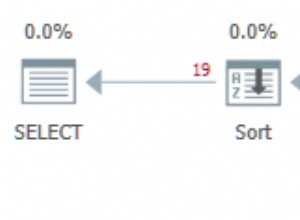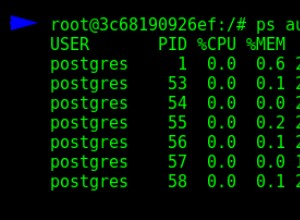MISE À JOUR :
Suite au nouveau commentaire ci-dessous :
(
SELECT t.*, COUNT(*) AS tagcount
FROM tagged td
LEFT JOIN tags t ON (t.id = td.tag_id)
GROUP BY td.tag_id
ORDER BY tagcount DESC, t.title ASC
LIMIT 3
) ORDER BY title ASC;
Résultat :
+------+------------+----------+
| id | title | tagcount |
+------+------------+----------+
| 3 | javascript | 2 |
| 1 | mysql | 2 |
| 2 | php | 3 |
+------+------------+----------+
3 rows in set (0.00 sec)
Changez simplement le LIMIT 3 à LIMIT 10 pour obtenir le top 10 au lieu du top 3.
Réponse précédente :
Pourquoi n'ajoutez-vous pas un LIMIT 10 à votre requête ?
SELECT t.*, COUNT(*) AS tagcount
FROM tagged td
LEFT JOIN tags t ON (t.id = td.tag_id)
GROUP BY td.tag_id
ORDER BY tagcount DESC, t.title ASC
LIMIT 10;
Scénario de test :
CREATE TABLE tags (id int, title varchar(20));
CREATE TABLE tagged (tag_id int, post_id int);
INSERT INTO tags VALUES (1, 'mysql');
INSERT INTO tags VALUES (2, 'php');
INSERT INTO tags VALUES (3, 'javascript');
INSERT INTO tags VALUES (4, 'c');
INSERT INTO tagged VALUES (1, 1);
INSERT INTO tagged VALUES (2, 1);
INSERT INTO tagged VALUES (1, 2);
INSERT INTO tagged VALUES (2, 2);
INSERT INTO tagged VALUES (3, 3);
INSERT INTO tagged VALUES (2, 4);
INSERT INTO tagged VALUES (3, 4);
INSERT INTO tagged VALUES (4, 5);
Résultat (en utilisant LIMIT 3 ):
+------+------------+----------+
| id | title | tagcount |
+------+------------+----------+
| 2 | php | 3 |
| 3 | javascript | 2 |
| 1 | mysql | 2 |
+------+------------+----------+
3 rows in set (0.00 sec)
Notez comment le [c] la balise n'est pas parmi les 3 premiers résultats et les lignes sont classées par ordre alphabétique en cas d'égalité.




